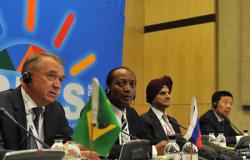Cutting Edge Issues in Development: Who drives climate relevant policies in the rising powers?

On Friday 12 January, Professor Hubert Schmitz, development economist and Emeritus Fellow at the IDS, delivered a talk about the drivers of climate relevant policies in new powerful states. The talk was part of the Cutting Edge in Development series, hosted by the Department of International Development. Four students, all from different Master’s programmes, reflect on the talk and tell us how it has influenced their research.
The urgency of climate action is such that the environmentalist movement can no longer afford to form or reject alliances to tackle environmental degradation and climate change based on a Kantian logic, where motives are the central consideration.
Policy-making literature teaches us that some level of collaboration between the three key actors in policy formulation – government, business and civil society – is necessary, given that no single actor has the capacity, expertise, financial means and political legitimacy to act unilaterally. The key takeaway from Professor Hubert Schmitz’s lecture on the actors driving climate-relevant policy in the rising powers was the importance of pursuing a co-benefit approach, where various types of alliances are crafted among actors with different interests, shifting, waxing and waning over time. For example, in his research on the environmental policy process in India and China, Professor Schmitz finds that the motive for government support of climate-relevant policy had more to do with energy security than with environmental concern, while business motives to engage in climate-relevant policy included securing green industry and international competitiveness.
As has become inevitable in many lectures on environmental topics, the discussion turned to Donald Trump and his relevance in international environmental policy negotiations. Despite the obvious relevance of the man elected to be the President of the United States, there is some space for optimism: recent alliance formation including the C40 compact of mayors to reduce greenhouse gas emissions in cities, and the business-led task force on climate-related financial disclosures indicate that perhaps Trump can be used to galvanise the environmental movement, acting as the common enemy to trigger the creation of alliances among actors with diverging motives.
Eleonora Moro is an MSc Environment and Development candidate at the LSE and a graduate of the PPE programme of the Free University of Bozen-Bolzano. Eleonora’s research interests include sustainable forest management and the nexus between women’s empowerment and environmental sustainability.
Through a political economy analysis of climate-relevant policies of China, India, Brazil and South Africa, Schmitz finds that no single actor has all key resources needed for transformation in policy to occur: money, organisation, legitimacy and expertise. Schmitz argues that focussing on alliances between different stakeholders such as government, business and civil society is key for successful policy-making. The analysis reveals that actors may collude for different interests, which are not necessarily related to environmental concern: for example, governments may wish to subsidize private-sector renewable energy projects to create green jobs.
But whilst identifying alignments of interests between different stakeholders helps explain the production of climate-relevant policies in the rising powers, what Schmitz analysis doesn’t help with is understanding how equitable such approaches have been. For example, what occurs when certain communities’ interests are not aligned with those of a public-private partnership? To be equitable, climate-relevant policy needs to engage with the interests of stakeholders with different levels of agency. Focussing on collusions of interests is likely to make actors who hold non-aligned interests under-represented. Yet, difficulties in enacting programs such as REDD+ in Brazil show the importance of meeting non-converging interests for successful policy implementation.
The real challenges in formulating climate-relevant policy lie where interests do not collude: Schmitz talk provides a useful description of how contemporary policy is formulated, but not as to how this process can be made more inclusive.
Marco Maragno is an Anthropology and Development MSc student. His academic interests include agriculture and development and the anthropology of humanitarian emergencies. Prior to the LSE, he was working in a sustainable development project in Colombia.
“Climate change” has been increasingly present in public debate around the world in the last few years. For thinking in effective ways of addressing this problem we need to improve our understanding of how decisions around climate policy are made. Exploring this was the aim of the talk given by Hubert Schmitz (IDS). In it he focused on describing who -and how- has influenced policies targeting climate change in India and China. The two countries have shown to be particularly relevant for the success of any global attempt to coordinate action trying to reduce greenhouse effect gases emissions; given the immense size of their populations and their rapid scaling of industrialization and energy demand.
Schmitz showed how in these “rising powers” government, businesses and civil society play different roles, with their particular weight of each shifting through time. For instance, in China businesses did not have a large relevance in energy discussions, but this trend has reversed in recent years, with Chinese industries manufacturing renewable energy machinery both for exporting and for internal demand. The speaker also emphasized how we need to focus in the alignments of interests amongst different actors for reaching consensus. Likely not all the actors will participate having as a priority to improve sustainability and reducing carbon emissions, but that does not mean meaningful agreements in that direction are not possible. The challenge therefore is in learning how to build alliances at the national level in order to make global action possible.
Still, what remains less clear is how we can challenge unstated assumptions about this transition to a “green future”. When we think about clean energy we also need to ask: energy for whom? Who is to take the negative impacts that continue increasing energy production entails? Even clean non-conventional energy production brings up political issues that need to be discussed democratically. And for this we need to learn from the mistakes we have made while exploiting resources we want to leave behind, like coal and oil.
Gabriela Cabaña is an Msc in Social Anthropology student. She graduated from Sociology at the Pontifical Catholic University of Chile. She is interested in what anthropology has to say about energy policymaking and its connections to broader political and economic issues of power, nature, inequality and conflict.
Whether rights or duty-based, international law has failed to compel binding pathways for climate mitigation that holds actors responsible across sectors and levels. The primary challenge for climate mitigation lies in the feasibility of identifying a polluting act and tangibly linking that to environmental consequences for the causal prerequisite necessary in legal action. Though this systems failure often exacerbates apathy, Dr. Hubert Schmitz challenges this resignation through a hopeful proposition where climate transformation is achievable outside legal enforcement through issue intersectionality and combined partnerships between various political and fiscal agendas.
Climate change is not only a conservation issue, but also one that threatens social and economic wellbeing and exacerbates the injustice of institutionalized inequality and systematized cycles of vulnerability. Dr. Schmitz highlights how “climate-relevant policies can draw on support from a wide constituency not just those with green convictions” and argues that “climate action is most effective politically when case is made for multiple benefit”. Dr. Schmitz’s lecture tasks policymakers, development practitioners, and us in academia to creatively and inclusively link the interests of public, private, and civic stakeholders towards climate mitigation. As thinkers, our role in climate mitigation must be actively building alternative pathways that effectively permits the connection of different motivations for shared solidarity.
Lauren Pak is a MSc. in Social Policy (Research) with a passion for just trade and extractive regulations that build infrastructure rather than exploit developmental capacity. The Hubert Schmitz Lecture encourages her to continue researching the intersections of tax treaties and developing countries capturing value in their natural resources while controlling for industrial emissions and transitioning to sustainable integration.
This first appeared on the LSE's International Development blog.
Image credit: GovernmentZA via Flickr (CC BY-ND 2.0)


